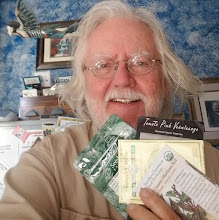As
I sat down to write this, I learned that the Farm Bill has been
approved by the Senate Committee and will be brought to a vote in the
Senate Floor. I have yet to see what was a part of the finalized
bill, but I am hoping that the Gillibrand Amendment was a part of the
bill. That amendment, proposed by Senator Kirsten Gillibrand of New
York, would have required that five percent of annual funding for
the AFRI program (Agriculture Food & Research Initiative) be used
for making sure that farmers have access to locally adapted seeds
and breeds, by focusing on public cultivar and bred development, and
removing the hurdles that have hindered USDA's progress toward this
goal.
This
initiative was in the 2008 Farm Bill, but the United Sates Department
of Agriculture (USDA) has succeeded in putting up roadblocks to avoid
dealing with anything like open pollinated, farmer bred seeds, even
though all of America's successful agriculture is based on just such
seeds.
Remember
that the seeds most gardeners cherish are not seeds bred by trained
scientists and research facilities. Most of the seeds gardeners love
and trust were bred by folks without degrees and often times even
without education. They grew food in their own gardens for their
families and prided their crops on much the same criteria we still do
today: does it taste good? Is it suited to my climate? Does it
succumb to disease or insects? And does it produce under adverse
conditions?
Sadly,
our modern seed production has little effort put to taste and nothing
about adverse conditions. Food is bred to be shipped, ripen on the
way to the market, last until the grocer has sold all of it and ease
of picking for a picking machine. Not exactly qualities we admire in
our gardens. But that's what we got when we began to allow
professionals to do the breeding. Thank God we stepped out of our
slumber in time, while there are still lots of varieties still left
(although if you've seen the National Geographic July 2011 chart on
our lost diversity, you have been staggered by what has been lost).
All
was not lost. After all, Native Seed/SEARCH in Tucson, AZ has been
saving the genetic diversity of the Southwestern Native tribes for a
number of years and Bill McDorman and his wife, Belle Starr, have
been offering classes in seed stewardship (and seed library
stewardship); Seed Savers Exchange is probably the largest and most
vibrant of our American seed saving organizations and now seed
libraries are suddenly the rage across an awakening nation. And the work of the Organic Seed Alliance helps position our current culture to seed a more local and diverse agriculture. More
people are aware of the value and importance of seeds – especially
seeds that are not controlled and cannot be controlled by
corporations.
It
would be fitting for the Farm Bill to leave committee today with
Gillibrand Amendment in place because, today, I learned, is
International Seed Day. April 26th
was chosen as the day because it was April 26th,
2004 that Paul Bremer, the
administrator of the Coalition Provisional Authority (CPA) in IRAQ,
issued and signed Order 81,
which prohibits Iraqi farmers from reusing seeds harvested from new
varieties registered under the law. Thank the powers that be, Order
81 could
not be successfully implemented due to the instability inside IRAQ.
It may go down in history as one of the quirks of fate that denied
Monsanto and other industrial ag firms their biggest victory of the
new century.
Next
year, I would love to see International Seed Day take on a lot more
meaning and become a holiday that is recognized by gardeners and
farmers everywhere. Time to celebrate the Percy Schmeiser's, the
pioneer seed savers and people like Bill and Belle. Time to chose to
eat a meal and consciously chew each bite thinking about the history
of the seeds that nourish us still to this day – the same way our
ancestors before us survived without the plenty we have today and it
was those seeds that persisted through the drought or the flood or
the war or the dust. They were sustained by these seeds; gifts from
a grandmother to a son, from an old hand to a young one – over
centuries, each generation in turn perfecting them a little more,
whether consciously or not. WE were given this largess. WE must
pass it on no matter what our government or society says.
In
a large sense, we are like prophets of old that know where the
richness of society really lies and know what must be done to save it
– to pass it on to our children. So today, April 26, chew each
bite one extra time with memory of the history you eat and resolve
that we will not be the generation that fails our children.
david







.jpg)
1 comment:
Thanks David for the thoughtful article. When the food is grown from good seeds the flavor is quite wonderful! I like to share this little writing about my favorite snack http://www.shanti4evr.blogspot.com/2011/10/food-in-viet-nam-young-sweet-rice-from.html
Best regards,
lien
Post a Comment